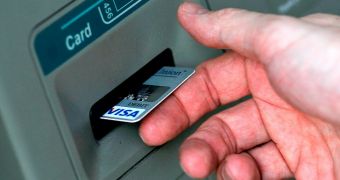Recent studies have shown that 95 percent of the ATMs worldwide are still running Windows XP, even though support for this particular OS version would come to an end in approximately 20 days.
It turns out that major US and UK banks are planning to purchase extended support from Microsoft until they manage to upgrade all ATMs to Windows 7, with a report by Reuters and citing sources close to the negotiations claiming that Redmond could cash in as much as $100 million (€72 million) for each contract.
Five big banks in the United Kingdom, including Lloyds Banking Group , Royal Bank of Scotland, HSBC, Barclays and Santander UK, are negotiating with the software giant an extended Windows XP support contract, but Redmond is also said to be involved in talks with US groups, such as Bank of America and Citigroup.
While banks and Microsoft refused to comment on how much the extended Windows XP support would cost, most of the financial institutions are planning to keep their ATMs fully patched until they complete the transition to another operating system.
JPMorgan, for example, will start the migration from Windows XP to Windows 7 in July and is expected to move all ATMs to the new platform by the end of this year. A total of 19,200 ATMs will be upgraded as part of this process, the bank said.
“There are certainly large enterprise customers who haven't finished their migrations yet and are purchasing custom support,” a company representative was quoted as saying by the source.
“The cost will depend on both the specific needs of the customer and what support they already have in place, so it's different for every customer.”
While it’s pretty clear that Microsoft will cash in hundreds of millions of dollars in the coming months just by providing Windows XP support to these entities, customers across the world will also be provided with some new features thanks to the upgrade of ATMs to newer platforms.
Reuters writes that newer operating systems would allow ATMs to be able to read cards with microchips, which are a lot more secure than the traditional magnetic stripes cards that could easily be cloned.
The majority of ATMs in the United States are still using traditional card readers, so there’s no doubt that this upgrade would come in handy to many bank customers in the country who will benefit from enhanced security for their credit cards.

 14 DAY TRIAL //
14 DAY TRIAL //